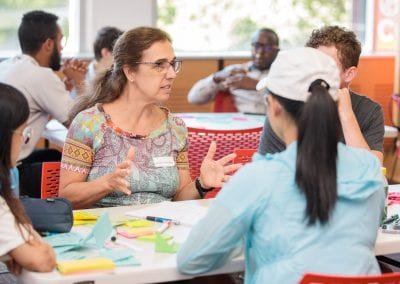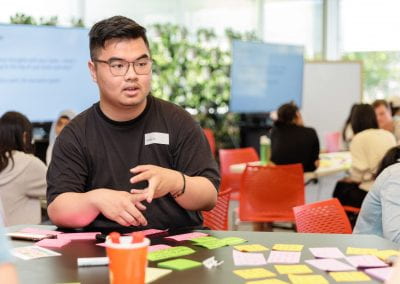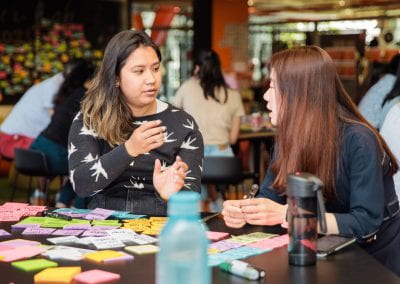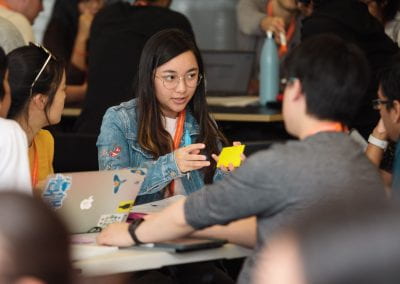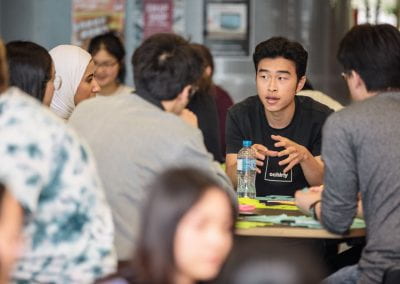
NEWSROOM
Teaching scientists to negotiate like artists (and vice versa)
16 April 2021
Summer entrepreneurship programme Summer Lab has formed the inspiration for the paper Entrepreneurship and Negotiation: Teaching Scientists to Negotiate Like Artists (and Vice-Versa), which examines the challenges and opportunities involved in teaching negotiation to aspiring entrepreneurs from diverse interests and backgrounds. Author Andrew Patterson, a professional teaching fellow at the University of Auckland’s Business School, has been accepted into the Negotiation Journal virtual conference on Entrepreneurship and Negotiation hosted by Harvard University and Babson College to share his findings.
Summer Lab, developed by the Business School’s Centre for Innovation and Entrepreneurship, is free and open to all current students and staff at the University of Auckland. Over the course of six weeks, participants learn the essential skills required to turn an idea into a business venture through action-oriented learning. In 2021, it was New Zealand’s largest summer entrepreneurship programme, with participants from a diverse range of backgrounds and interests. Participants learn about ideation, the Lean Canvas, market validation, building a minimum viable product, intellectual property, financial basics, pitching to investors and raising capital. The programme also includes a negotiation workshop, annually delivered by Andrew Patterson. Andrew brings the concepts of negotiation to life through examples, discussions, practical advice, a recorded negotiation video, use of virtual reality (VR) technology, and a team negotiation experience.
Andrew says “Teaching negotiation to business students is one thing. We can assume our students have self-selected into an area of study where notions of value creation and value capture are already of interest. Teaching negotiation to students who are talented in the arts, engineering, law, or science is a completely different proposition. Students of entrepreneurship programmes differ markedly from those of business and law. Some may be interested in the business of entrepreneurship and others in social enterprises.”
Andrew notes that there tends to be a natural attraction or strength to either the ‘science’ or ‘art’ of negotiation, based on academic background. He uses these terms to loosely distinguish between numbers-based elements of negotiation such as formulating proposals, calculating zones of possible agreement, and notions of capturing value; and, harder to quantify areas such as interpersonal dynamics, improvisation, interpreting and controlling body language and emotions, listening skills and questioning techniques.
Confidence is an important contributing factor to success in negotiation. Participants in Summer Lab were surveyed and had middling confidence in their ability to negotiate at the start of the programme. Part of this may be attributed to the average age and experience of programme participants. Andrew also notes the impact of culture on confidence and propensity to initiate negotiation. “In New Zealand, people tend not to seek out opportunities to create or capture additional value through negotiation. Experiences negotiating and sharing insights on negotiation in Australia, China, and the USA is different. There is an element of hesitancy and a certain degree of conflict avoidance inherent in New Zealand society.”
At the start of the programme, participants were surveyed and less than 50 percent of participants agree with the statement “I am confident in my ability to negotiate effectively”. Confidence levels at the conclusion of the workshop were 67% in the first year that Andrew ran the negotiation workshop and up to 84% in the latest programme. Andrew partially attributes the change to iterating the workshop over the years, scaling up and down tactics such as incorporating VR into experiential learning. “Sharing examples from a host of different settings appears effective in maintaining participant engagement. Examples include classic buyer-seller negotiations, job offers, employment relationship problems, diplomatic and political negotiations. Role-plays also increase student engagement and learning retention”
Andrew says that as Summer Lab is a co-curricular programme where participants are not vying for course credit, it helps with psychological safety and the ability for participants to be more experimental and vulnerable in the way they participate in the negotiation workshop. “The intent is to develop their negotiation skills, increase their confidence, and familiarise them with a more complete picture of negotiation, rather than assess them on what they already know and can do. Care is taken in the discussion that follows to not congratulate teams that may have ‘won’ over their counterparts. Instead the discussion is framed around strategic intent, the negotiating dynamic, reasons why particular approaches may have played out as they did, and how these link to theory.”
Andrew says “Professional networks grow as a direct result of these workshops and it is rewarding to follow and sometimes work with teams that go on to advance their entrepreneurial endeavours. Summer Lab is a great opportunity for students to learn about their strengths and weaknesses in a supportive environment. They can experiment and make mistakes before the stakes are real and they’re negotiating with investors, employees, suppliers, competitors, or the government.”
Andrew’s recommended reads to learn about negotiation:
The Art of Negotiation – Michael Wheeler
Negotiating the Impossible – Deepak Malhotra
Entrepreneurial Negotiation – Samuel Dinnar and Lawrence Susskind
The Strategy of Conflict – Thomas Schelling
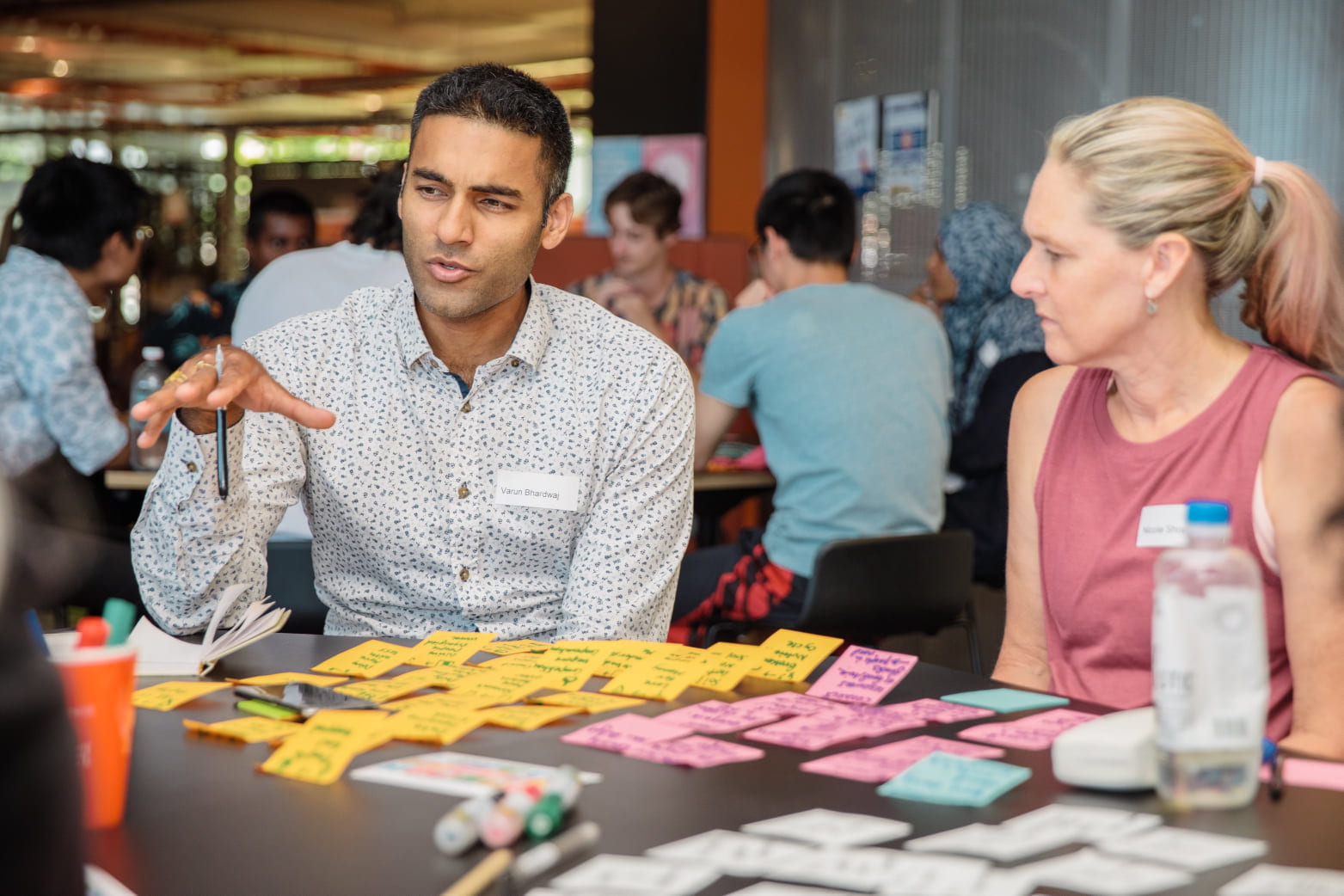

16 April 2021
Summer entrepreneurship programme Summer Lab has formed the inspiration for the paper Entrepreneurship and Negotiation: Teaching Scientists to Negotiate Like Artists (and Vice-Versa), which examines the challenges and opportunities involved in teaching negotiation to aspiring entrepreneurs from diverse interests and backgrounds. Author Andrew Patterson, a professional teaching fellow at the University of Auckland’s Business School, has been accepted into the Negotiation Journal virtual conference on Entrepreneurship and Negotiation hosted by Harvard University and Babson College to share his findings.
Summer Lab, developed by the Business School’s Centre for Innovation and Entrepreneurship, is free and open to all current students and staff at the University of Auckland. Over the course of six weeks, participants learn the essential skills required to turn an idea into a business venture through action-oriented learning. In 2021, it was New Zealand’s largest summer entrepreneurship programme, with participants from a diverse range of backgrounds and interests. Participants learn about ideation, the Lean Canvas, market validation, building a minimum viable product, intellectual property, financial basics, pitching to investors and raising capital. The programme also includes a negotiation workshop, annually delivered by Andrew Patterson. Andrew brings the concepts of negotiation to life through examples, discussions, practical advice, a recorded negotiation video, use of virtual reality (VR) technology, and a team negotiation experience.
Andrew says “Teaching negotiation to business students is one thing. We can assume our students have self-selected into an area of study where notions of value creation and value capture are already of interest. Teaching negotiation to students who are talented in the arts, engineering, law, or science is a completely different proposition. Students of entrepreneurship programmes differ markedly from those of business and law. Some may be interested in the business of entrepreneurship and others in social enterprises.”
Andrew notes that there tends to be a natural attraction or strength to either the ‘science’ or ‘art’ of negotiation, based on academic background. He uses these terms to loosely distinguish between numbers-based elements of negotiation such as formulating proposals, calculating zones of possible agreement, and notions of capturing value; and, harder to quantify areas such as interpersonal dynamics, improvisation, interpreting and controlling body language and emotions, listening skills and questioning techniques.
Confidence is an important contributing factor to success in negotiation. Participants in Summer Lab were surveyed and had middling confidence in their ability to negotiate at the start of the programme. Part of this may be attributed to the average age and experience of programme participants. Andrew also notes the impact of culture on confidence and propensity to initiate negotiation. “In New Zealand, people tend not to seek out opportunities to create or capture additional value through negotiation. Experiences negotiating and sharing insights on negotiation in Australia, China, and the USA is different. There is an element of hesitancy and a certain degree of conflict avoidance inherent in New Zealand society.”
At the start of the programme, participants were surveyed and less than 50 percent of participants agree with the statement “I am confident in my ability to negotiate effectively”. Confidence levels at the conclusion of the workshop were 67% in the first year that Andrew ran the negotiation workshop and up to 84% in the latest programme. Andrew partially attributes the change to iterating the workshop over the years, scaling up and down tactics such as incorporating VR into experiential learning. “Sharing examples from a host of different settings appears effective in maintaining participant engagement. Examples include classic buyer-seller negotiations, job offers, employment relationship problems, diplomatic and political negotiations. Role-plays also increase student engagement and learning retention”
Andrew says that as Summer Lab is a co-curricular programme where participants are not vying for course credit, it helps with psychological safety and the ability for participants to be more experimental and vulnerable in the way they participate in the negotiation workshop. “The intent is to develop their negotiation skills, increase their confidence, and familiarise them with a more complete picture of negotiation, rather than assess them on what they already know and can do. Care is taken in the discussion that follows to not congratulate teams that may have ‘won’ over their counterparts. Instead the discussion is framed around strategic intent, the negotiating dynamic, reasons why particular approaches may have played out as they did, and how these link to theory.”
Andrew says “Professional networks grow as a direct result of these workshops and it is rewarding to follow and sometimes work with teams that go on to advance their entrepreneurial endeavours. Summer Lab is a great opportunity for students to learn about their strengths and weaknesses in a supportive environment. They can experiment and make mistakes before the stakes are real and they’re negotiating with investors, employees, suppliers, competitors, or the government.”
Andrew’s recommended reads to learn about negotiation:
The Art of Negotiation – Michael Wheeler
Negotiating the Impossible – Deepak Malhotra
Entrepreneurial Negotiation – Samuel Dinnar and Lawrence Susskind
The Strategy of Conflict – Thomas Schelling
EMAIL
CIE@AUCKLAND.AC.NZ
POSTAL ADDRESS
THE UNIVERSITY OF AUCKLAND BUSINESS SCHOOL
PRIVATE BAG 92019, AUCKLAND






